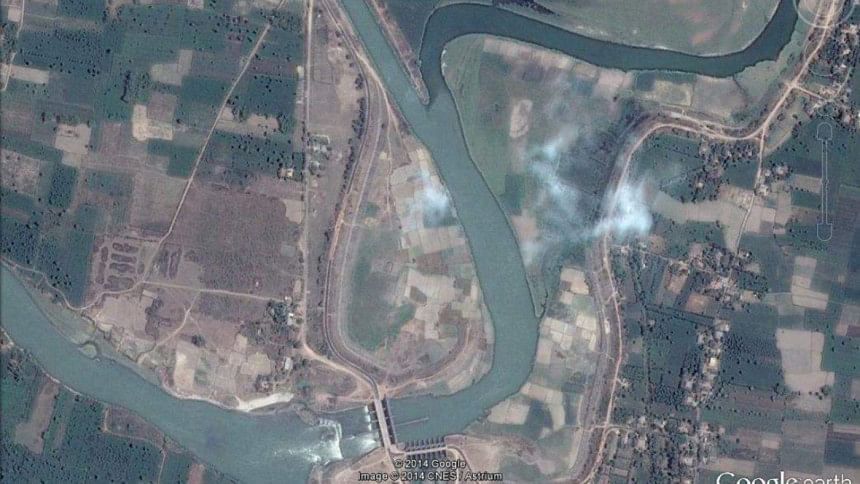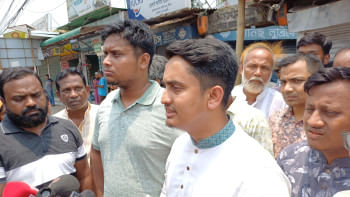Mamata's visit: Hope for Teesta agreement?

THE Chief Minister of Paschimbanga, Mamata Banerjee, paid a visit to Bangladesh from February 19 to 21. It is known from the media that her visit was made as per invitation of the Foreign Ministry of Bangladesh. Mamata arrived with a 40 member team comprising of ministers of her cabinet, lawmakers, writers, singers, actors, businessmen, journalists, and other distinguished personalities. Though her visit was official, she was not empowered to sign bilateral treaties; so, it was rather a pleasure trip to Bangladesh.
Mamata took part in a view exchange meeting `Boithoki Bangla' with the cultural and distinguished personalities of both India and Bangladesh on the February 20 at Hotel Sonargaon, Dhaka. In that meeting she told the participants not to worry about Teesta water sharing agreement. She expressed her happiness that hurdles would be removed to pass the Land Boundary Agreement between India and Bangladesh in Rajya Sabha. She expressed her commitment to set up a Bangabandhu Chair in the Kolkata University and name an airport after poet Kazi Nazrul Islam. She met with President Abdul Hamid on that day. On February 21, she laid floral wreaths at the Central Shaheed Minar; and later, she met with Prime Minister Sheikh Hasina. At the time of this meeting, Hasina asked her to give due share of Teesta water while Mamata asked for withdrawal of ban on hilsa export to India. Hasina said that hilsa would go when Teesta water came. Hasina asked for sufficient water in Teesta so that boats could ply.
In the 37th meeting of the Joint Rivers Commission in Delhi, the Bangladesh Water Resources Minister Ramesh Chandra Roy demanded 50-50 distribution of the Teesta water at Gazaldoba point. At that time he expressed satisfaction by getting 3,500 cusec of water without asking, and said that it could be more through talks (The Daily Star, 18.03.2010). By January 2011, it was in the air that the Teesta water sharing agreement was imminent, with the formula of dividing the flow 50-50, keeping aside 20% of the total flow for the river. But we got some contradictory standpoints of the Bangladesh government in the media before the visit of the then Indian prime minister to Bangladesh in September 2011. The Bangladesh PM's advisor Mashiur Rahman said: "In fact we do not know how much water is flowing through the Teesta River. We are to measure it for 17 years, then after the agreement shall be signed.'(The Daily Star 3 September 2011). In fact, the water flowing down from Sikkim in the Teesta River is being obstructed by the Gazaldoba Barrage and diverted by a link canal to the Dahuk-Mahananda-Mechi-Fulhar Rivers. This transfer of water from Brahmaputra basin to Ganga basin is unacceptable, and it violates the International Convention on Non-navigational uses of Watercourses of 1997 in force since August 17, 2014. Water of a river can be used on equitable basis where the minimum historical flow has to be maintained for the life of the river, without causing harm to other states.
The then Indian Prime Minister Manmohan Singh visited Bangladesh on September 6, 2011, accompanied by the chief ministers of five Indian states -- Assam's Torun Gogoi, Meghalaya's Mukul Sangma, Tripura's Manik Sarker and Mizoram's Lalthan Hawla. But as Mamata, chief minister of Paschimbanga did not come, the Teesta deal was not signed. It was reported in the media that she wanted to give Bangladesh 25% share only, so the summit failed. On September 8, Foreign Affairs Secretary of Bangladesh Mijarul Quayes said at a press conference: "Teesta agreement is finalised; we are not to give any more concession." Does the Bangladesh stand on Teesta waters still remain? The Kolkata Bangla daily Anandabazar Patrika reported on February 11, 2012 that Manmohan Singh was trying to restart the Teesta water sharing issue accepting Mamata Banarjee's terms. "West Bengal will be deprived," complained Mamata, and declined to join Manmohan Singh's entourage to Dhaka.
The Indian government always reiterated that "India will do nothing that will harm Bangladesh" on using or intervening on the common rivers. But India is doing harm by withdrawing almost the entire flow of the river Teesta during lean periods. In April 2014, several political parties undertake long marches towards the Teesta River in protest against the Indian actions. A Google Image dated April 16, 2014 shows the Teesta water being diverted and released in the Dahuk River of West Bengal, which has outfall in the Fulhar River upstream of Farakka Barrage. On that date Teesta River was left dry inside Bangladesh, causing severe damage to the crops in Teesta Project areas.
The UN watercourse convention 1997 Article 7.2 says: "Where significant harm nevertheless is caused to another watercourse State, the States whose use causes such harm shall, in the absence of agreement to such use, take all appropriate measures, having due regard for the provisions of Articles 5 and 6, in consultation with the affected State, to eliminate or mitigate such harm and, where appropriate, to discuss the question of compensation." Question arises; does the Bangladesh side ever mention this international convention on any discussion table? Mamata's visit may remove some hurdles, but arriving at an equitable sharing of Teesta water seems far off.
The writer is Chairman, Institute of Water & Environment. Email: [email protected]

 For all latest news, follow The Daily Star's Google News channel.
For all latest news, follow The Daily Star's Google News channel. 



Comments